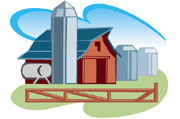Bulletin #2319, Maine Farm Safety Program: Safety Training and Supervision of Workers

Bulletin #2319, Maine Farm Safety Program: Safety Training and Supervision of Workers (PDF)
By Dawna L. Cyr, Farm Safety Project Assistant, and Steven B. Johnson, Ph.D., Extension Crops Specialist
For information about UMaine Extension programs and resources, visit extension.umaine.edu.
Find more of our publications and books at extension.umaine.edu/publications/.
A workplace should be free from recognizable hazards and employees should be trained to work safely. Follow-up training will ensure employees work safely. Good supervision will make any farm operation run smoothly and successfully.
Training of Farm Workers
Do not look for the perfect person for the job but, rather, the right person for the right job. A worker should be physically and mentally able to handle a particular job. Assign people to jobs they are most capable of doing.
Inexperienced workers must be trained for the jobs they will be doing. Orient experienced people who have worked on other farms to your particular methods and machinery, and always provide training when assigning them to new jobs.
Anyone training workers should know the job thoroughly and be able to explain it in a step-by-step manner. Use the actual materials when training and give careful attention to safety precautions.
- Make sure all workers know their job and are properly trained.
- Rotate work that is monotonous, boring or disagreeable.
- Explain emergency procedures.
- Encourage good safety habits.
- Never allow horseplay in a work area.
Instruct in four distinct steps:
- Put the workers at ease. Explain why the job is important, and how doing it correctly and safely is beneficial. Do not talk down to workers.
- Explain the job one step at a time while the trainee observes from the work position. Make sure the trainee understands why and how the job is done a certain way.
- Have the workers repeat the operation several times. Give help on the rough spots. Then have the steps explained to you by the workers as they do them. Repeat the procedure until you are confident the job will be handled safely.
- Put your employees to work. Check often at first and invite questions. Explain what to do if there is an emergency.
Call safety rule violations to a worker’s attention before they become habits. Do this privately. Inform all workers of the safety rules on the farm. Make them aware of telephones and posted emergency numbers, fire extinguishers, and contingency plans. Keep workers updated on any new safety procedures, personal protective equipment, and machinery. Provide the proper protective gear. Be sure it fits and is in good operating condition.
Inform all workers of the safety rules on the farm. Make them aware of telephones and posted emergency numbers, fire extinguishers, and contingency plans.
Most young workers have good physical abilities but may lack the experience, knowledge, judgment, and patience that make for consistently safe job performance. Young workers must be intensively trained and more closely supervised than experienced workers only if the experienced workers do not have bad habits or attitudes. Do not allow horseplay, show-off behavior or dangerous equipment and vehicle operation. Make sure all equipment is maintained properly and that safety guards and features are in place and functional.
Supervision
Successful supervision requires assigning work according to ability. Praise workers when they do jobs well. Communicate by listening and speaking. Show a positive attitude toward work and set a good example. Follow-up on rule violations. Find out why they were broken, and correct the problem. Train and reprimand with a cool head. If possible, rotate work that is boring, strenuous, or disagreeable.
Do not over-supervise workers, nor be unreasonable in work expectations. If they are competent, let them work without feeling that you are watching every move. Also, to demand too much might lead to resentment and accident-producing fatigue.
This Maine Farm Safety fact sheet is part of an educational fact sheet series produced by University of Maine Cooperative Extension. For more information on farm safety, contact your UMaine Extension County Office.
Information in this publication is provided purely for educational purposes. No responsibility is assumed for any problems associated with the use of products or services mentioned. No endorsement of products or companies is intended, nor is criticism of unnamed products or companies implied.
© 2003, 2020
Call 800.287.0274 (in Maine), or 207.581.3188, for information on publications and program offerings from University of Maine Cooperative Extension, or visit extension.umaine.edu.
In complying with the letter and spirit of applicable laws and pursuing its own goals of diversity, the University of Maine System does not discriminate on the grounds of race, color, religion, sex, sexual orientation, transgender status, gender, gender identity or expression, ethnicity, national origin, citizenship status, familial status, ancestry, age, disability physical or mental, genetic information, or veterans or military status in employment, education, and all other programs and activities. The University provides reasonable accommodations to qualified individuals with disabilities upon request. The following person has been designated to handle inquiries regarding non-discrimination policies: Director of Equal Opportunity and Title IX Services, 5713 Chadbourne Hall, Room 412, University of Maine, Orono, ME 04469-5713, 207.581.1226, TTY 711 (Maine Relay System).

